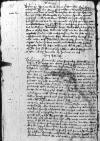Was wir in deiner sachenn das dorf ⌊Selesne⌋ botreffende / mit dem hernn ⌊pomerelischenn woiwoden⌋ gehandelt und erhaltenn habenn, / wirt dir der edle und ernvheste her ⌊George Scheueken⌋, / dem wir solchs in unserem ⌊⌋ angezeigt, / nicht vorhaltenn. / Welches wir auch also / sunder zweiffel, / dieweil das der her ⌊wojwode⌋ auf sich genomen, / ein glucklichenn vortgang gewinnen werden uns vorhoffenn. / Von wegen ⌊Greger Melletkeym⌋, / so das gut ⌊Polschaw⌋ in bositz hatt, / haben wir auch mit dem hern ⌊woiwoden⌋ zureden nicht nachgelassenn, / der die sache bass auf negstkomende ⌊tagfarth⌋ kegen ⌊Marienburg⌋ vorlegt hat, / alda neben uns darin zu handlenn, damit genantem Greger etzwas davor zukeret werde, / das du ihm also wirst kundt thun, / damit ehr an die zeit zu ⌊Marienburg⌋ erscheine. / Gotlichen genaden bovolen.
